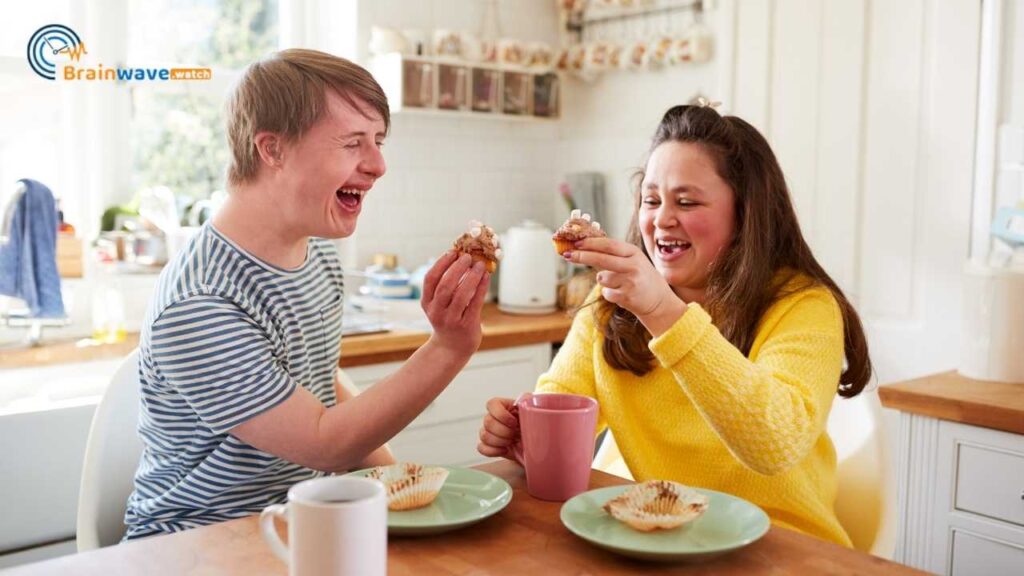There are many misconceptions surrounding Down syndrome. Historically, people with Down syndrome were institutionalized and faced tremendous discrimination. Thankfully, societal attitudes have improved significantly in recent decades.
However, stigmas and stereotypes persist. People with Down syndrome are often infantilized, assumed to be overly happy and loving, and considered perpetual children. In reality, they have a wide range of personalities and abilities like anyone else.
Many adults with Down syndrome live independently, have jobs, and are capable of meaningful relationships. While they may need some extra support in certain areas of life, their condition does not define them or diminish their humanity. With the right opportunities and encouragement, people with Down syndrome can thrive and live fulfilling lives.
Legal and Ethical Considerations
There are a few legal and ethical issues to consider when dating someone with Down syndrome or another intellectual disability.
Dating and Marriage Laws
Most developed countries allow people with intellectual disabilities to date, have sex, and get married. There are rarely laws prohibiting relationships or sex. However, some laws regarding the capacity to consent may come into play.
Consent and Capacity
People with Down syndrome typically reach sexual maturity and develop romantic interests like anyone else. However, intellectual ability varies widely. Some individuals may not fully understand the implications of sexual relationships. A partner must be capable of freely giving informed consent. Assess capacity to consent on a case-by-case basis. Some factors to consider are the person’s ability to understand actions and consequences, resist coercion, and communicate desires.
Risk of Exploitation
Unfortunately, people with disabilities are at higher risk of sexual abuse and exploitation. It’s crucial that romantic partners have good intentions and don’t take advantage. Look for genuine connection, equality, and respect. Safeguarding against manipulation is a shared responsibility.
Acting Ethically
Approach any relationship ethically, focusing on the humanity of your partner rather than just disability. Get to know them as an individual. Ensure you both can act freely as consenting adults. Consider consulting with caregivers if you have concerns about ethics or safety.
Benefits of Inclusive Dating
Dating someone with Down syndrome can provide many benefits for both partners. It creates opportunities for social inclusion, which is important for human well-being. Having an intimate relationship can foster a sense of belonging and connection. It also allows the person with Down syndrome to learn relationship skills like communication, compromise, and expressing affection.
Dating boosts self-esteem and confidence in one’s desirability. It provides positive validation and makes the person feel valued by their partner. This is especially important for individuals with Down syndrome, who are often overlooked or seen as asexual. A fulfilling dating relationship reminds them that they deserve love and intimacy like anyone else.
For non-disabled partners, relationships with someone who has Down syndrome can teach empathy, patience, and compassion. It can open their eyes to new perspectives and deepen their capacity for unconditional love. The joy and simplicity people with Down syndrome take in relationships forces partners to focus on emotional connection.
Challenges and Concerns
Dating someone with Down syndrome comes with unique challenges and concerns. Here are some of the key issues to be mindful of:
Logistical Issues
-
Transportation can be a challenge if your partner cannot drive. You may need to arrange for transportation or assist with public transit.
-
Planning dates and activities together require some additional logistics. Make sure activities are accessible and accommodating.
-
Living situations may be a consideration if you progress in your relationship. Ensure you discuss each other’s needs and expectations around housing.
Communication Difficulties
-
People with Down syndrome can have speech delays or challenges expressing themselves clearly. Patience and learning communication styles are important.
-
Don’t make assumptions about comprehension. Check for understanding and ask clarifying questions.
-
Use multiple modes of communication as needed, such as text, pictures, writing, etc. Find what works best.
Managing Family Expectations
-
Family members may have strong opinions about the relationship. Have open and honest discussions.
-
Recognize that over-protectiveness comes from a place of care. Help your family see your partner’s independence.
-
Set healthy boundaries if the family is overly involved. Your partner deserves autonomy.
-
Reassure your family you’ll be considerate of any extra support your partner needs.
-
Appreciate concern but make clear it’s your life and your choice to make.
The key is discussing challenges openly, problem-solving together, and figuring out solutions. With effort and understanding, these issues can be managed.
Setting Boundaries and Building Trust
When entering any romantic relationship, it’s important to set boundaries and build trust gradually over time. This is especially true when dating someone with Down syndrome or other developmental disabilities. While every person is unique, those with Down syndrome often appreciate taking relationships slowly and prioritizing communication.
Respecting the pace and preferences of your partner is key. Not everyone with Down syndrome has the same interests or desires when it comes to physical intimacy or romantic activities. Some may progress through relationship stages more slowly than is typical. Discussing comfort levels regularly and obtaining ongoing consent before engaging in new activities together is crucial.
Don’t make assumptions about what your partner does or doesn’t want physically or emotionally. Have open and honest conversations to understand their needs. Let them share feelings at their own pace. Developing trust requires patience, and not pressuring your partner into anything they aren’t ready for or fully comfortable with.
Take cues from your partner’s reactions. If they seem hesitant or unsure, take a step back and check in about consent. Make sure you both want the same things. Moving too fast can damage emerging trust. Focus on building a solid foundation first through shared interests, quality time, and gradual romantic gestures before progressing the relationship. Mutual comfort and consent should drive the timeline, not external expectations.
With open communication, respect, and taking it slow, beautiful relationships can form and flourish. Prioritize your partner’s happiness and let trust develop naturally over time. If you’re both willing to listen, understand, and compromise, you can navigate any challenges and celebrate each milestone together.
Supporting Independence
Individuals with Down syndrome deserve the dignity of independence in a relationship, just like anyone else. While caring for your partner is important, it’s also crucial to avoid being overly protective or controlling.
The key is allowing your partner to take the lead in the relationship and make their own choices whenever possible. Check in about their needs and preferences, but let them initiate activities, conversations, and intimacy. If you’re unsure if they need assistance with something, ask how you can support them before jumping in.
Also, focus on cultivating their self-advocacy skills. During conflicts or disagreements, resist the urge to intervene unless asked. Instead, help your partner express themselves and stand up for their wants and feelings. Provide advice if requested, but avoid making decisions for them.
With patience and encouragement, you can foster the confidence and self-determination your partner deserves. A thoughtful balance of care and independence will allow the relationship to flourish.
Handling Community Perceptions
Dating someone with Down syndrome can elicit judgmental reactions or offensive comments from some people in the community. It’s important to respond to these situations tactfully and avoid escalating tensions.
When faced with offensive remarks, try to stay calm. Respond in a measured, educational way by challenging people’s assumptions and prejudices. Explain that your partner is an adult capable of consent and that you have a healthy, positive relationship based on mutual interests and caring. Appeal to people’s sense of fairness and compassion.
It also helps to surround yourself with a supportive community. Seek out advocacy groups dedicated to inclusion, disability rights, and ending stigma. They can provide moral support and advice for responding to criticism. You don’t have to tackle insensitive comments alone.
With patience and understanding, we can educate others and create more accepting attitudes. Focus on living your life fully with your partner and don’t let fear of judgment hold you back from a fulfilling relationship. Aim to be a positive example of an inclusive, caring partnership.
Advice for Family and Friends
When a loved one with Down syndrome begins dating, it can stir up many emotions for family and friends. However, it’s important to handle the situation thoughtfully. Here are some tips:
-
Support, don’t interfere. Resist the urge to meddle in the details of the relationship. Instead, focus on being loving and supportive. Let your loved one make their own choices.
-
Respect their autonomy. Don’t make assumptions about what your loved one can or can’t handle in a relationship. Respect their right to develop connections and intimacy.
-
Recognize natural milestones. Dating and relationships are a normal part of adult life. So support your loved one who is going through the same developmental stages as others their age.
-
Educate yourself. Learn about healthy relationships and sexuality for adults with intellectual disabilities. Understand their needs for companionship.
-
Have candid conversations. Discuss important topics like safety, boundaries, values, and life goals. But allow your loved one to share their voice.
-
Speak up if concerned. If you notice warning signs of abuse or manipulation, have a caring talk. But avoid policing normal affection.
-
Get to know their partner. Make an effort to welcome their partner and thoughtfully assess if it seems a good match. But give the benefit of the doubt.
-
Offer practical support. Help with logistics like transportation for dates. But don’t insert yourself into the plans uninvited.
With patience and open communication, you can support your loved one’s journey to maturity and self-determination in relationships. The key is balancing care with respect for their autonomy.
Making the Relationship Work
Dating someone with Down syndrome can be very rewarding, but also requires effort to ensure a healthy and fulfilling relationship. Here are some tips:
-
Open and ongoing communication is key. Discuss your needs, challenges, and boundaries. Check-in regularly to address any issues. Be patient and don’t make assumptions.
-
Have patience and willingness to learn. Understand there may be differences in communication, social skills, cognition, or maturity levels. Educate yourself about Down syndrome.
-
Accommodate different needs. Be flexible about finding activities you both enjoy at your own pace. Respect boundaries and needs for personal space or assistance. Offer support but allow independence.
-
Focus on each other’s abilities, not disabilities. Build a relationship of equals based on trust and respect, not caregiver/care receiver roles.
-
Celebrate milestones and enjoy shared interests. Do fun activities you both like. Emphasize your common humanity, values, and goals.
With openness, empathy, and effort, an inclusive romantic relationship can be meaningful and fulfilling. The keys are respect, communication, and seeing each other for who you truly are.
Conclusion
The key takeaways are to value your partner for who they are, focus on their abilities not limitations, and work together to build trust and intimacy at a pace you’re both comfortable with. Expectations may need to be adjusted, but with patience and compassion, you can find fulfillment.
In the end, an inclusive society starts with inclusive relationships. Dating someone with Down syndrome can be incredibly rewarding if you embrace each other’s differences and focus on the universal human needs we all share – to love and be loved, to feel valued and understood. With an open mind and open heart, people of all abilities can find meaningful connections.







